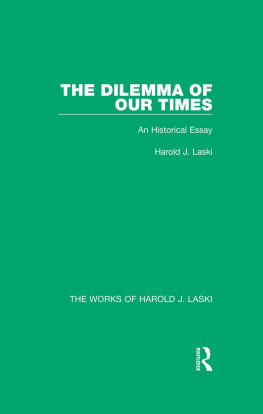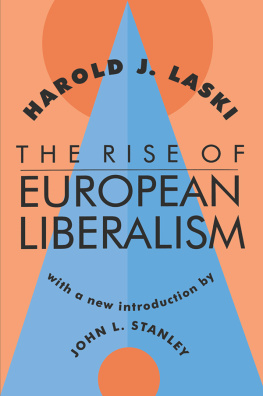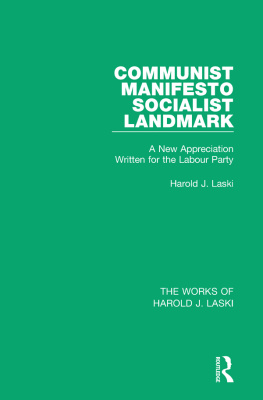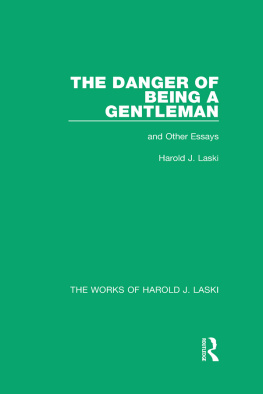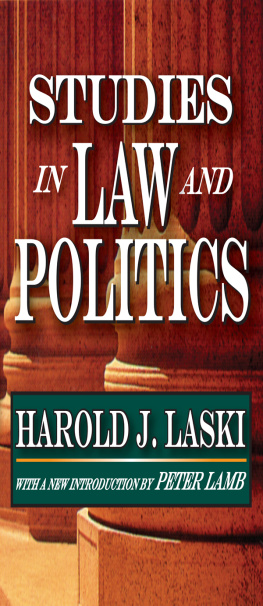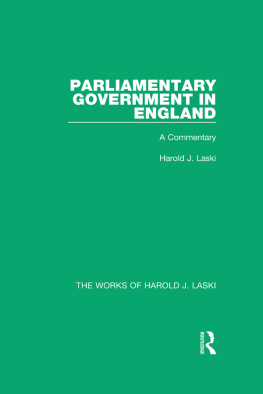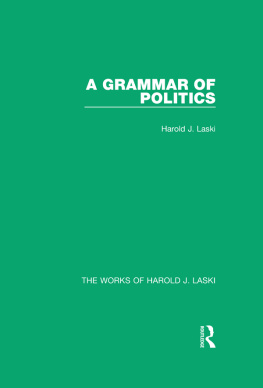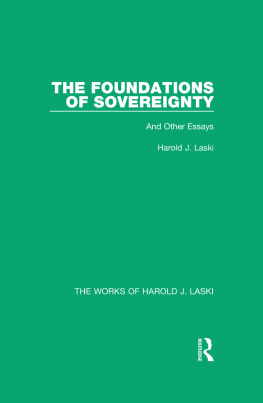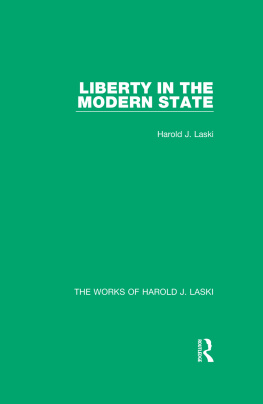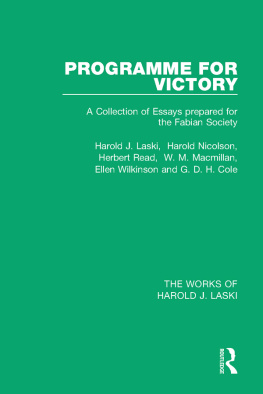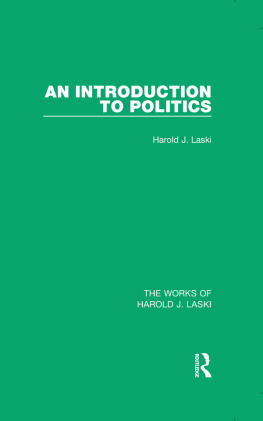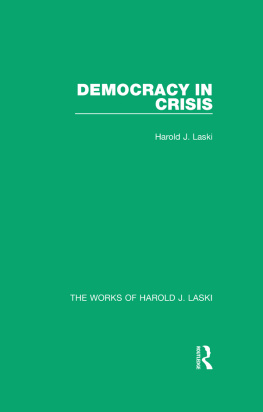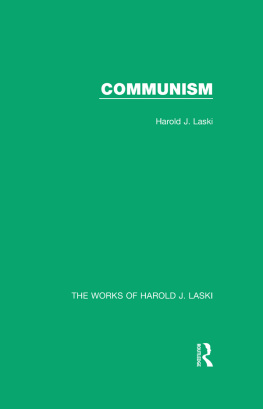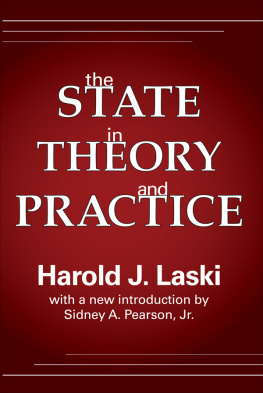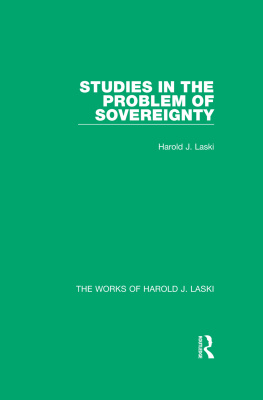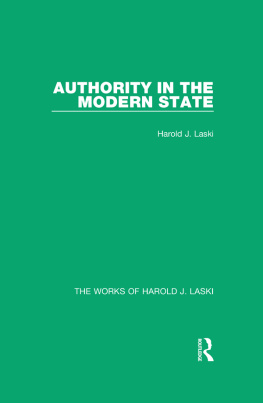THE WORKS OF HAROLD J. LASKI
Volume 18
THE DILEMMA OF OUR TIMES
THE DILEMMA OF OUR TIMES
An Historical Essay
HAROLD J. LASKI
First published in 1952 by George Allen & Unwin Ltd
This edition first published in 2015
by Routledge
2 Park Square, Milton Park, Abingdon, Oxon, OX14 4RN
and by Routledge
711 Third Avenue, New York, NY 10017
Routledge is an imprint of the Taylor & Francis Group, an informa business
1952 George Allen & Unwin Ltd
All rights reserved. No part of this book may be reprinted or reproduced or utilised in any form or by any electronic, mechanical, or other means, now known or hereafter invented, including photocopying and recording, or in any information storage or retrieval system, without permission in writing from the publishers.
Trademark notice: Product or corporate names may be trademarks or registered trademarks, and are used only for identification and explanation without intent to infringe.
British Library Cataloguing in Publication Data
A catalogue record for this book is available from the British Library
ISBN: 978-1-138-81912-2 (Set)
eISBN: 978-1-315-74273-1 (Set)
ISBN: 978-1-138-82248-1 (Volume 18)
eISBN: 978-1-315-74251-9 (Volume 18)
Publishers Note
The publisher has gone to great lengths to ensure the quality of this reprint but points out that some imperfections in the original copies may be apparent.
Disclaimer
The publisher has made every effort to trace copyright holders and would welcome correspondence from those they have been unable to trace.
THE DILEMMA OF OUR TIMES
AN HISTORICAL ESSAY
BY
HAROLD J. LASKI
PREPARED FOR PRESS
BY
R. T. CLARK
FIRST PUBLISHED IN 1952
This book is copyright under the Berne Convention. Apart from any fair dealing for the purposes of private study, research, criticism or review, as permitted under the Copyright Act 1911, no portion may be reproduced by any process without written permission. Inquiry should be made to the publishers.
PRINTED IN GREAT BRITAIN
in 11-point Times Roman
BY THE BLACKFRIARS PRESS LTD LEICESTER
I N 1943 Harold Laski wrote and in 1944 published what he called an essay in historical analysis under the title of Faith, Reason and Civilisation.1 The date is important. It was written amid the heavy duties of his war-time activities, governmental, party and professorial, largely, one feels, to clear his own mind on the issues confronting the world as a result first of the war then fiercely raging and second of the victory in which he was confident. That year saw what appeared to be to many a real closing of the breach between Russia and the West which, always open, though in the heyday of the united opposition of national majorities to Hitler proved capable of being narrowed, had been violently widened to the verge of virtual completeness by the Russo-Nazi treaty of 1939 whereby the Bolshevik revolution to the consternation of all its friends and not a few of its enemies ranged itself on the side of wanton and brutal aggression and of the plan to dominate the free world, and sealed the bargain in the classic manner by the unforgivable re-partition of Poland.
That the assassins of Poland would eventually fall out was apparent to even the dullest but honest student of politics, but it remained a matter of anguished speculation whether it would come soon enough to save the free world which in 1940 and the early part of 1941 was never quite free from the apprehension, justified now by the latest diplomatic revelations, that it might yet have to meet the Red Army in the field. The sudden attack on Russia by Hitler in 1941 virtually ended for the war period at least that particular apprehension, but still left the future of Western-Russian relations a matter of doubt, for the permanent alliance between them on which a durable and profitable peace was held to depend, an alliance of states differing in aim and ideology and having these differences openly or secretly actively at work within the body politic of each of them, in turn depended on internal changes and mental readjustments, all of which were bound to encounter fierce opposition even if political ambitions could be reconciled and political fears removed.
With others who held themselves to be friends, if critical ones, of Russia and her revolution, Laski had gone through the emotions of the pre-war period when the union of the anti-Nazi forces appeared the only guarantee of peace, and suffered the deep disillusion when Mr. Stalin renounced that union in favour of close alliance with what was considered the common enemy. But by 1943 all alike had been fused in the excitement of having Russia as an ally of the West and of receiving at least indications that alliance would be interpreted as necessitating a move in Russia itself away from imperialism and towards democratic freedom.
In that atmosphere much of the past had to be discarded and the new situation analysed as a point of departure towards what was called the revolution of our times. The purpose of the essay was to study the historical background, and from it glean at once the possibilities of such a development and the lines on which those who wished reconciliation in a new and united free world should best go. It was obvious that from the material point of view victory would leave Russia and the United States incomparably the strongest states; they would also be able to exercise the greatest political and spiritual influence, and it was the effects of that exercise which troubled so much of the old world now dethroned from its pride of place. To both nations Laski was deeply attached. In Russia he saw a process at work creating a new form of society and with it new values; in the United States he saw a nation still like Russia in the stage of becoming which had not indeed broken with the historic past as Russia had done but was capable of a similar creation. In their reconciliation Laski saw at once the hope and the peril of the future but without in the least minimising the historic obstacles which were placed in the way of both and in the way of all other states which would assuredly in their weakness be attracted to one or other.
The question was whether the world would follow their united lead or which it would follow should they not remain united, in which case the tendencies in each most calculated to annoy the other would be developed. Laski therefore made of the essay a searching examination of the moral, intellectual and political crisis of the time. It was written with the same precipitation as that of the thoughts which crowded into his mind in his scanty leisure hours. It was not definitive; it could not be in a time of violent change of unforeseeable extent. It examined and stated problems rather than solved them. It did not prophesy the future which was being at the moment decided in the first instance on the battlefields. It sought mainly to indicate the consequences to that future of not solving the right problems in what he believed to be the right way. It contained strong even violent criticisms of men and policies since criticisms alone could warn the readers of the dangers involved in certain evolutions which had been tacitly accepted, a warning addressed mainly as always to younger readers, who had found in actual war or in war work a respite alike from crisis and the urgency of solution.

